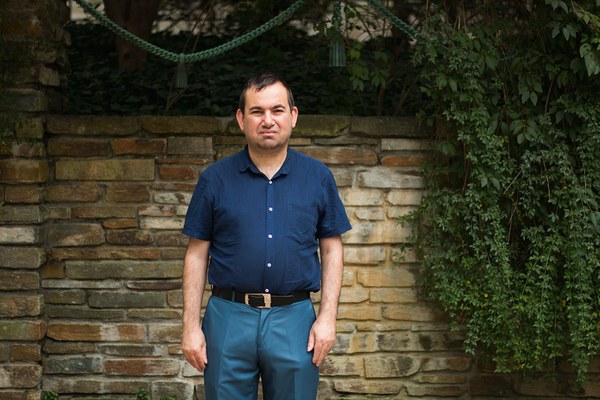Savvas Kyriakidis, a research fellow at the Center for Advanced Study in Sofia, Bulgaria, was a recent fellow in Byzantine Studies. His research report, “Oath-Taking and Oath-Breaking in Byzantium (13th–14th Centuries),” investigated oath-taking, the concept of honor in Byzantium, and the use of the oath as an instrument of subversive activities and duplicity.
Q&A with Savvas Kyriakidis
How would you use an oath in Byzantium—for instance, when buying groceries?
An oath was supposed to give social confidence between individuals and between individuals and institutions. On an informal level, it was like what we do today: saying, I swear to my faith or whatever. The formal way involved various rituals, many of which we don’t know a lot about, but mostly an appeal to divine powers was deemed necessary. In a formal environment, people would usually raise their hand or touch the Gospels, or the relics of saints and holy people, or any other holy and sacred item, typically a cross.
Using the oath to buy groceries shows that even in small transactions, people needed the means to confirm trust. It’s interesting that objections that arose to oaths mostly focused on the means or witnesses used, not the act itself.
Why did the oath persist despite potential replacements?
Mostly the oath persisted because it had strong cultural roots coming from the Roman world, which was the cultural predecessor of the Byzantine Empire. The idea of appealing to witnesses was a much older institution than, for example, ordeals. There were many types of ordeal, but the one we know from Byzantium is the ordeal by hot iron. What would happen is the accused, the defendant, walked with a piece of hot iron in his hand. If he healed, he would be found guilty of the crime according to how long the healing took. The distance he had to cover and the time healing was supposed to take depended on the nature of the crime. Many, many sources indicate some of these trials were fixed.
Ordeals were something that came from abroad, from western Europe. They were very common in the medieval West, and increasingly close contact with the region through commerce and the Crusades familiarized the Byzantines with many western European cultural, judicial, and ideological institutions. Particularly the Byzantine aristocracy was open to foreign influence: there were some high-profile trials by ordeal, involving even the emperor himself.
But there were no provisions about ordeals in Roman law. Because of their foreign influence, judges and people of authority were very cautious and effectively rejected them.
Other replacements included excommunication and curses, which were also part of the Byzantine tradition, but I am still researching why they increased so much in the later centuries. My time at Dumbarton Oaks made me understand I need to expand the scope of my research. I found sources and resources here I had not been aware of before. Exchanging ideas with Dimiter Angelov, Costas Constantinides, and the other fellows and visiting scholars was very helpful. [Resident Program Director for Byzantine Studies] Anna Stavrakopoulou and the other program directors, such as Frauke Sasche in Pre-Columbian Studies, gave me very good advice.
How do oaths help us understand conspiracies against Byzantine emperors?
If we start etymologically, the Byzantine term for conspiracy requires an oath! It means swearing together, forming a league. Written sources confirm that all these people who wanted to conspire against the emperor took an oath of solidarity and trust between them. They needed to find a way to bind each other with an oath and ensure they were locked together. This shows something very important: quite often they did not really trust each other. There are instances where they took this oath to encourage each other to actually plot against the throne.
Also, conspirators felt the need to justify their actions, because they had first taken an oath of loyalty to the emperor, and then took another oath to conspire against the emperor. The most common justification was to claim the emperor was acting illegally against the virtues required to justify his state on the throne—so they were acting in legal defense against the tyrant.
Julia Ostmann was 2018–2020 postgraduate writing and reporting fellow at Dumbarton Oaks. Photo by Elizabeth Muñoz Huber, 2018–2020 postgraduate digital media fellow.

